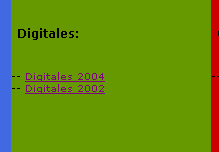Aristarkhova, Irina. Virtual Chora: Welcome. http://www.aristarkhova.org.
Bernadac, Marie-Laure and Hans-Ulrich Obrist, eds. Louise Bourgeois: Deconstruction of the Father,
Reconstruction of the Father. Cambridge: MIT Press, 1998.
Carnegie, Elizabeth. ‘Trying to Be an Honest Woman: Making Women’s Histories’. Making Histories in
Museums. Gaynor Kavanagh, ed. London: Leicester University Press, 1996.
Chadwick, Whitney. Women, Art and Society. Third Edition. London: Thames and Hudson
Ltd, 2002.
Cooper-Greenhill, Eilean. Museums and the Interpretation of Visual Culture. London: Routledge, 2000.
de Certeau, Michel.‘L’espace de l’archive ou la Perversion du Temps’.Traverses: Revue du Centre de Création Industrielle, Vol 36. Paris: Centre Georges Pompidou, 1986.
Dekoven, Marianne ed. Feminist Locations: Global and Local, Theory and Practice. New
Brunswick: Rutgers University Press, 2001.
Derrida, Jacques. Archive Fever: A Freudian Impression. Trans. Eric Prenowitz. Chicago: The University of Chicago Press, 1995.
Doane, Mary Ann. The Emergence of Cinematic Time: Modernity, Contingency, and the Archive. Cambridge: Harvard University Press, 2002.
Foucault, Michel. The Order of Things. London: Routledge, 1989. (First published in French in 1966)
Kavanagh, Gaynor. Dream Spaces: Memory and the Museum. London: Leicester University Press, 2000.
Haraway, Donna. ‘A Cyborg Manifesto: Science, Technology, and Socialist Feminism in the Late 20th Century’. Simians, Cyborgs and Women: The Reinvention of Nature. New York: Routledge, 1991. pp. 149-181.
Martin, Paul. Popular Collecting and the Everday Self. London: Leicester University Press, 1999.
Parker, Rozsika and Griselda Pollock. Old Mistresses: Women, Art and Ideology. London:
Pandora, 1981.
Personal Narratives Group eds. Interpreting Women’s Lives: Feminist Theory and Personal
Narratives. Bloomington: Indiana University Press, 1989.
Pollock, Griselda ed. Generations and Geographies in the Visual Arts: Feminist Readings.
London: Routledge, 1996.
Robinson, Hilary ed. Feminism-Art-Theory: An Anthology 1968-2000. Oxford: Blackwell, 2001.
V2_Publishing. Information is Alive: Art and Theory on Archiving and Retrieving Data.
Rotterdam: V2_Publishing, 2003.






